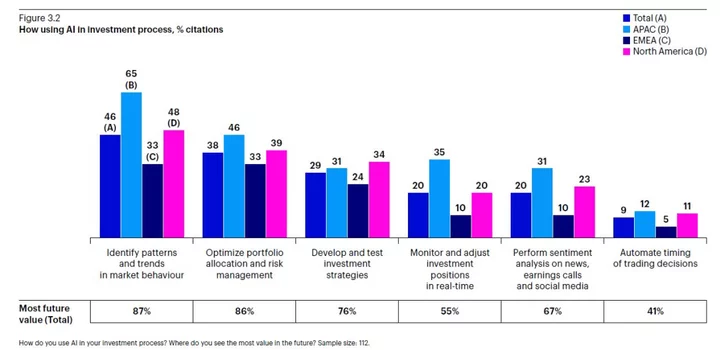
Quants With $23 Trillion See AI Takeover Even as They Hold Back
The financial world’s computer-loving crowd is preparing for the dawn of a new AI-powered era — but that
2023-10-30 16:19

HSBC Plans $3 Billion Share Buyback, CEO Touts Capital Strength
HSBC Holdings Plc announced a fresh buyback program and hinted at the potential for further returns to investors
2023-10-30 16:18

Citadel’s Griffin Flies Asia-Based Staff to Disney in Tokyo
Billionaire Ken Griffin paid for some 1,200 Asia-based staff and family members to travel to Tokyo’s Disney resort
2023-10-30 15:48

Your brain doesn’t work the same on Zoom, scientists say
Your brain doesn’t work the same when you speak to someone on Zoom, scientists have confirmed. Neural signalling is significantly less when chatting to someone through a video call rather than having a face-to-face conversation, the new study found. When researchers watched the brain of someone talking in real life, they found that there was a detailed and complex system of neurological activity. On Zoom, however, that was dramatically less. It suggests that there is still something fundamentally lacking about speaking with someone online. People’s faces are not able to light up people’s brains in the same way, the researchers suggest. That is something of a surprise: current models suggest that the brain should process people’s faces in the same way whether they are on Zoom or in real life, given the features of them are the same. But the new study suggests that there really is something fundamentally different between the two contexts. “In this study we find that the social systems of the human brain are more active during real live in-person encounters than on Zoom,” said Joy Hirsch, a Yale professor who was the lead author on the new study. “Zoom appears to be an impoverished social communication system relative to in-person conditions.” To find that, researchers studied people’s brains in real time as well as looking at other signals, such as where people’s eyes moved. As well as increased neural activity, the researchers found that people’s eyes hovered for longer on the real faces, for instance. The two people’s brains also seemed to be more co-ordinated. That suggests that there are more social cues being shared between the two people, they said. “Overall, the dynamic and natural social interactions that occur spontaneously during in-person interactions appear to be less apparent or absent during Zoom encounters,” Professor Hirsch said. “This is a really robust effect.” The study suggests that face-to-face encounters remain very important, even as technology companies and others come up with new ways for us to interact with people remotely, the authors said. “Online representations of faces, at least with current technology, do not have the same ‘privileged access’ to social neural circuitry in the brain that is typical of the real thing,” said Professor Hirsch. The findings are described in a new paper, ‘Separable Processes for Live “In-Person” and Live “Zoom-like” Faces’, published in Imaging Neuroscience. Read More Scientists reveal what talking on Zoom does to your brain – and it’s not good Infrared lights spotted on Uranus could be clue to alien life Elon Musk says X posts with misinformation are ‘ineligible for revenue share’
2023-10-30 15:28

HSBC May Lift Variable Pay By $300 Million, Costs to Rise
HSBC Holdings Plc said it may increase some variable pay, resulting in higher expenses, after it announced a
2023-10-30 15:16

Russia's Shoigu accuses West of seeking to expand Ukraine war to Asia-Pacific
BEIJING Russian Defence Minister Sergei Shoigu said the West wants to expand the conflict in the Ukraine to
2023-10-30 15:16

Portuguese police apologise to Madeleine McCann's parents
Senior officers travelled to the UK to meet Gerry McCann earlier this year, the BBC is told.
2023-10-30 14:51

Levi Davis: Missing rugby player's family say they live in hope
Levi Davis' mum says she "prays he will turn up one day" as she marks a year since his disappearance.
2023-10-30 14:47

Toyota Global Sales, Output Hit Record 5.6 Million Vehicles
Toyota Motor Corp.’s global sales climbed 8.3% in April to September from a year earlier to a record
2023-10-30 14:45

China's Oct factory activity likely rose as economy finds footing: Reuters poll
By Joe Cash BEIJING China's manufacturing activity likely expanded for a second straight month in October, a Reuters
2023-10-30 13:51

Scientists say we’ve all been using sunscreen wrong in new skin cancer warning
Most people do not apply enough sunscreen or wear adequate clothing when out in the sun for too long, according to a new study that warned that the product may be giving them “a false sense of security”. The research, published recently in the journal Cancers, sheds more light on the observation that melanoma and skin cancer rates are rising globally despite a rise in sunscreen usage – an oddity termed the “sunscreen paradox”. “The problem is that people use sunscreen as a ‘permission slip’ to tan. People think they are protected from skin cancer because they are using a product marketed to prevent a condition,” study co-author Ivan Litvinov from McGill University in Canada said. In the research, scientists found that Canadians living in provinces with incidence rates for melanoma – one of the most aggressive forms of skin cancer – were more likely to report using sun protection, more aware of the health risks of sun exposure, and more apt to follow the UV index. Overall, scientists assessed data from 22 focus groups encompassing 95 Atlantic Canada residents. The analysis found that despite reporting more awareness and intent for protection from the sun, people in these provinces received more sun exposure due to warmer temperatures and a tendency to engage in outdoor activities. In another assessment of people in the UK, they found contradicting evidence that sunscreen use was surprisingly linked to an over two-fold risk of developing skin cancer. “These combined findings suggest a sunscreen paradox, whereby individuals with higher levels of sun exposure also tend to use more but not an adequate quantity of sunscreen or other sun-protection measures, providing a false sense of security,” Dr Litvinov explained. Scientists call for new interventions, considering this sunscreen paradox, to address knowledge gaps in sun protection and skin cancer prevention. “Sunscreen is important, but it is also the least effective way to protect your skin when compared to sun protective clothing, rash guards, and sun avoidance. People can and should enjoy the outdoors, but without getting a sunburn or a suntan,” Dr Litvinov added. Read More If being without your phone fills you with dread, you could have nomophobia When do the clocks go back in the UK this year? Nursery places and wraparound childcare plans announced
2023-10-30 13:47

Kerala attacks: India police investigate bomb blasts at prayer meet
A 12-year-old girl was among the three people who died after a series of explosions in Kerala state.
2023-10-30 13:45
